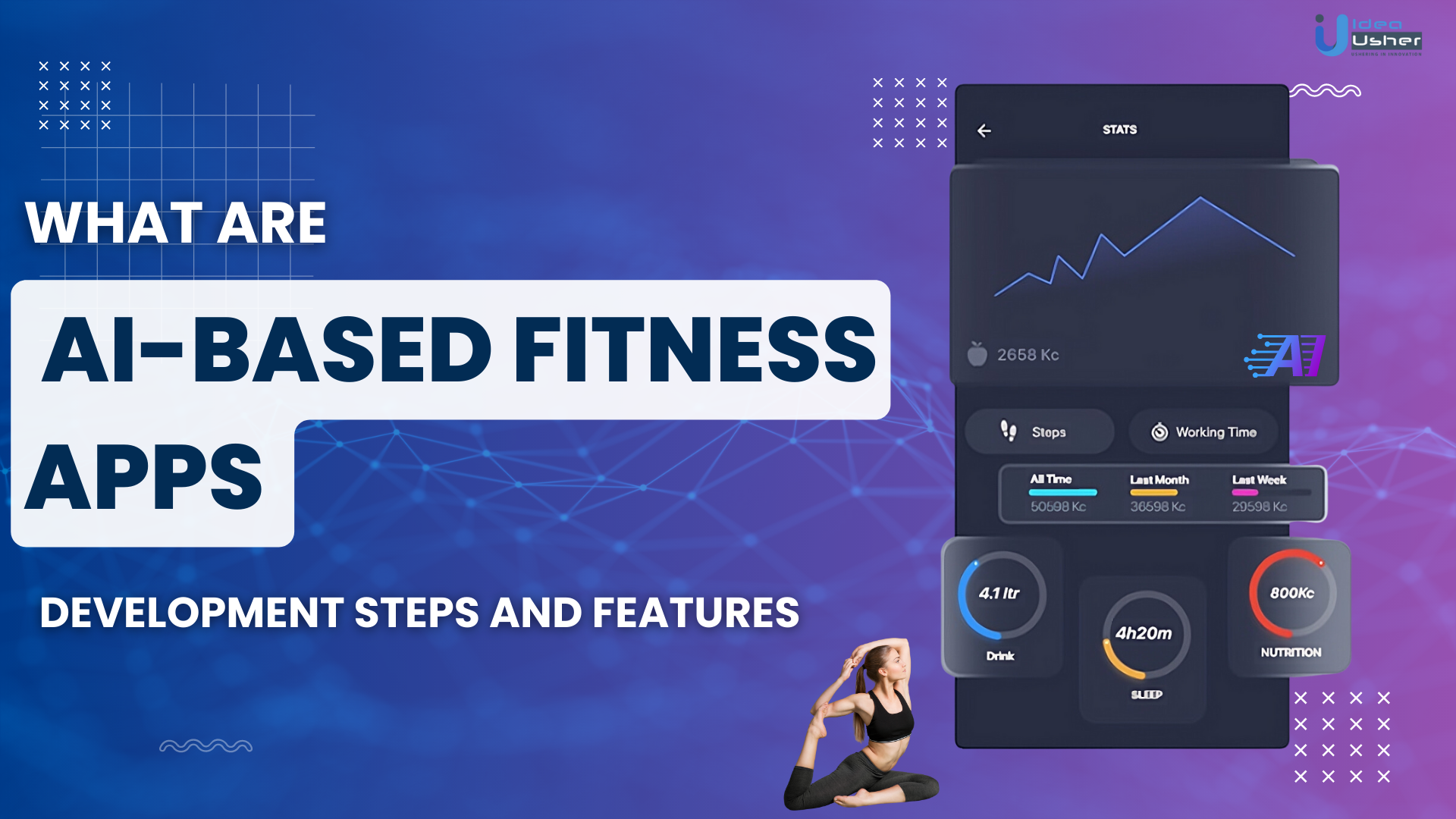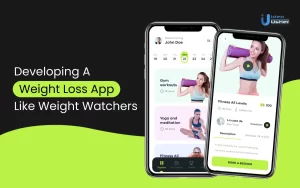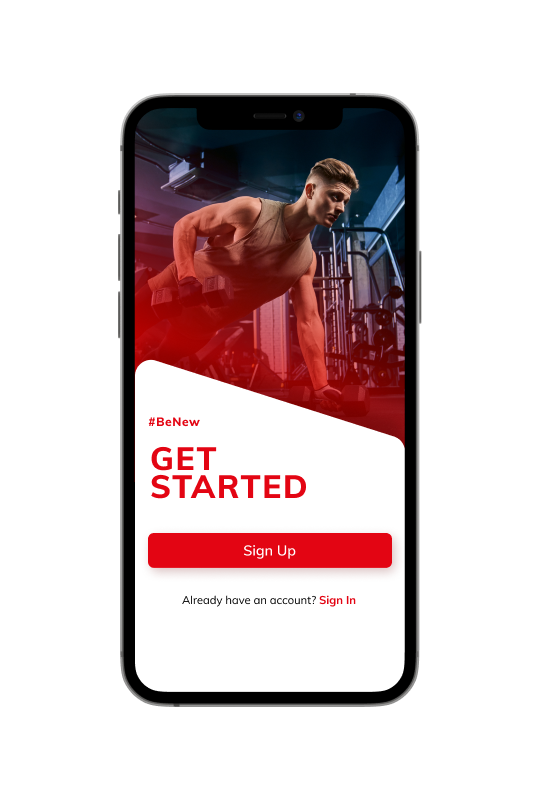Technology is continuously transforming the way we approach our workout routines. One of the latest innovations in the fitness industry is AI-based fitness apps. These apps leverage the power of artificial intelligence to enhance workout efficiency, reduce the risk of injuries, and offer personalized coaching tailored to individual needs.
fitness apps have become an integral part of people’s lives, helping them stay on track with their health and fitness goals. With the rapid advancements in technology, the integration of artificial intelligence (AI) into fitness apps has revolutionized the way users engage with these platforms.
In this article, we will explore the concept of AI-based fitness apps and their role in revolutionizing the way we stay fit and healthy.
Understanding AI-Based Fitness Apps And Growing Trend
AI-based fitness apps are cutting-edge tools that utilize artificial intelligence algorithms to analyze data and provide tailored workout plans. By harnessing machine learning and data from millions of workouts, these apps can optimize exercise sets, track progress, and offer personalized recommendations.

The global fitness app market experienced substantial growth, reaching a value of USD 1.3 billion in 2022. This growth is projected to continue with a compound annual growth rate (CAGR) of 17.6% from 2023 to 2030. The COVID-19 pandemic played a significant role in this surge, as nationwide lockdowns and social distancing measures encouraged a shift from traditional gyms to virtual fitness platforms. Consequently, there was a notable increase in the adoption of fitness apps, leading to a surge in downloads and subscriptions.
According to the American College of Sports Medicine (ACSM) report, fitness apps ranked 13th among the top fitness trends in 2019. This indicates the growing popularity and recognition of fitness apps as a valuable tool in the health and wellness industry.
In summary, the fitness app market has experienced remarkable growth, driven by the impact of the pandemic and the increasing preference for virtual fitness solutions. As the industry continues to evolve, fitness apps are expected to play a pivotal role in promoting and supporting people’s fitness goals worldwide.
driven by the growing demand for personalized fitness solutions. The global fitness technology market is a testament to the rising popularity of AI in the fitness industry. The increasing emphasis on health and wellness, coupled with the convenience of AI-powered fitness apps, has propelled this market to unprecedented heights.
As users increasingly seek tailored fitness experiences, AI fitness apps have become indispensable tools in achieving optimal physical health. These apps not only streamline workout routines but also offer motivational support, data-driven insights, and a sense of accomplishment, fostering long-term adherence to fitness goals.
What is an AI Fitness App?
An AI fitness app is a cutting-edge application that utilizes artificial intelligence algorithms to generate personalized workouts based on individual fitness goals, performance history, and preferences. These apps analyze vast databases of workout data, incorporating insights from millions of workouts, to optimize sets, repetitions, and weights for each exercise. By harnessing the power of AI, these apps can deliver tailored training regimens, allowing users to achieve their fitness goals effectively and efficiently.
How Does an AI Fitness App Work?
An AI fitness app is a software application that incorporates artificial intelligence and machine learning algorithms to provide personalized fitness guidance and support to users. The app typically operates in the following manner:
User Profile Creation:
The first step involves users creating their profiles by providing essential information such as age, weight, height, fitness goals, medical history, and exercise preferences. This data helps the AI understand the user’s individual needs and customize the fitness program accordingly.
Data Collection:
AI fitness apps can gather data from various sources, including wearable fitness devices (like smartwatches or fitness trackers), smartphones, and other connected fitness equipment. These devices record metrics like heart rate, steps taken, distance traveled, and calories burned.
AI Analysis:
The collected data is processed and analyzed by the AI algorithms. Machine learning models may be used to recognize patterns and trends in the user’s fitness behavior and progress.
Personalized Workout Plans:
Based on the user’s profile and data analysis, the AI generates personalized workout plans. These plans take into account the user’s fitness goals, current fitness level, time availability, and any physical limitations.
Real-Time Guidance:
During workouts, the AI fitness app can offer real-time guidance and feedback. It may provide exercise demonstrations, technique corrections, and motivation to keep the user engaged and focused.
Progress Tracking:
The app continuously tracks the user’s progress by analyzing the data generated from workouts and activities. It can assess improvements, identify areas that need attention, and adjust the fitness program accordingly.
Nutritional Guidance:
Some AI fitness apps may include features for dietary tracking and provide personalized nutritional advice to complement workout plans.
Motivation and Gamification:
To keep users motivated, the app may incorporate gamification elements, such as challenges, achievements, and rewards for achieving fitness milestones.
Community and Social Sharing:
Many AI fitness apps have social features that enable users to connect with others, share achievements, and participate in fitness communities. This fosters a sense of accountability and support.
Adaptation and Learning:
The AI fitness app continues to learn from user interactions and feedback. As it gathers more data and insights, it can refine its recommendations and adapt the workout plans to better suit the user’s changing needs.
The Advantages of AI Technology in Fitness App Development
AI has ushered in a new era of possibilities in the fitness sector, opening doors to numerous benefits that enhance user experiences and optimize workout routines. Here are some of the key advantages of integrating AI into fitness app development:
1. Customized Diet Planning
AI-based diet and nutrition apps take personalized care to a whole new level. These apps utilize self-adjusting diet algorithms, analyze user progress, and make adjustments in real-time. By tracking data over specific intervals, AI-driven diet suggestions become more effective and tailored to the individual’s needs. With AI’s precision, users can maintain a healthier diet, leading to improved overall well-being.
2. Human Pose Simulation
One of the remarkable AI features is human pose estimation, which analyzes body positions during exercises and workouts. By using advanced techniques like contours modeling, volume modeling, and skeleton modeling, AI-powered fitness apps ensure users perform exercises with the correct posture, reducing the risk of injuries and optimizing workout effectiveness.
3. Wearable Integration
AI technology has been seamlessly integrated into wearable fitness devices, such as smartwatches and fitness trackers. By combining AI with wearables, these devices can gather comprehensive user data, detect irregularities in vital signs, and offer personalized suggestions to improve fitness performance. With AI-powered wearables, users can maintain a detailed health profile, leading to better insights and healthier lifestyles.
4. Personal Training Apps
AI-powered personal training apps are game-changers in the fitness industry. These apps act as virtual personal trainers, guiding users through their workouts, offering real-time feedback, and ensuring they perform exercises correctly. With just a smartphone camera, users can receive professional-level training, making fitness more accessible and effective than ever before.
5. Performance Improvement
AI integration in fitness gadgets and wearables enables users to set personalized fitness goals based on various parameters. By considering factors like height, weight, and individual progress data, AI provides actionable insights, empowering users to enhance their performance and achieve their fitness objectives.
Enhancing User Experience with AI-Powered Features
Here are some of the ways AI-powered features enhance user experiences in fitness apps:
1. Personalized Training Routines
AI fitness apps take a holistic approach to designing personalized training routines. By considering individual fitness levels, goals, and preferences, these apps create customized workout regimens that align with each user’s specific needs. Gone are the days of generic workout plans; AI ensures that every exercise is purposeful and effective.
2. Real-Time Feedback and Corrections
AI-powered personal trainers within fitness apps offer real-time feedback and corrections to users during workouts. By analyzing movements through smartphone cameras, AI identifies any discrepancies in posture and technique, providing immediate suggestions for improvement. This feature not only minimizes the risk of injuries but also maximizes the benefits of each exercise.
3. Progress Tracking and Analytics
AI fitness apps provide users with comprehensive progress tracking and analytics. By analyzing data from each workout, users gain valuable insights into their performance, allowing them to make informed decisions regarding their fitness journey. From calorie burn and heart rate analysis to muscle strength development, AI-powered apps provide a detailed overview of users’ progress.
4. Motivational Support
Staying motivated is a key factor in achieving fitness goals. AI fitness apps address this by incorporating motivational support features. Through personalized notifications, achievement badges, and encouraging messages, these apps keep users inspired and committed to their fitness routines.
5. Activity Tracker
An activity tracker is a fundamental feature that allows users to monitor their daily physical activities, such as steps taken, distance covered, and calories burned. This feature encourages users to set and achieve activity goals, promoting an active lifestyle.
6. Heart Rate Monitoring
Heart rate monitoring is essential for tracking users’ cardiovascular performance during workouts. Integrating heart rate sensors or leveraging smartphone sensors can provide real-time feedback, helping users stay within their target heart rate zones.
7. Calorie Counter
A calorie counter is a valuable tool for users looking to manage their weight effectively. By logging their food intake and physical activities, users can keep track of their daily calorie balance, ensuring they meet their fitness objectives.
8. Diet Planner
An AI-powered diet planner can suggest personalized meal plans based on users’ dietary preferences, health goals, and activity levels. Providing users with nutritional insights empowers them to make informed choices about their diet.
9. Sleep Tracking
Sleep is a critical component of overall well-being. Integrating sleep tracking features allows users to monitor sleep patterns, identify sleep disruptions, and make adjustments to improve their sleep quality.
The Future of AI Fitness Apps: Innovations and Possibilities
As AI continues to evolve, the future of fitness apps is bound to be even more exciting and transformative. Here are some potential innovations and possibilities on the horizon:
1. Virtual Reality Integration
Imagine entering a virtual fitness studio, surrounded by stunning landscapes or futuristic environments, all while receiving guidance from an AI-powered virtual trainer. Virtual reality integration could revolutionize home workouts, making them more immersive, engaging, and enjoyable.
2. AI-Powered Nutritional Guidance
AI’s potential extends beyond workout routines; it could also play a significant role in guiding users’ dietary choices. AI-powered nutritional guidance could offer personalized meal plans, recipe recommendations, and even real-time feedback during grocery shopping trips.
3. Biometric Data Utilization
In the future, AI fitness apps may leverage biometric data like facial recognition and gait analysis to gain deeper insights into users’ health and well-being. This data-driven approach could provide more accurate assessments of fitness progress and help users make more informed decisions about their lifestyles.
The Top 10 AI-Powered Fitness Apps
These cutting-edge applications leverage artificial intelligence and machine learning models to deliver personalized training programs, enhanced user experiences, and optimized fitness regimens.
1. FitnessAI – Your Personalized Gym Companion
FitnessAI stands out as an outstanding app that harnesses the power of artificial intelligence to curate personalized training programs for each user. Originally designed for gym-goers, FitnessAI has recently adapted to cater to the growing demand for at-home exercise. The app optimizes weight lifting sets, repetitions, and weights for every activity, pushing users to achieve their muscle-building goals effectively. With its algorithm trained on a staggering 5.9 million exercises and data collected from over 30,000 expert weightlifters and gym enthusiasts, FitnessAI promises to outperform any human personal trainer, making it a must-have app for fitness enthusiasts.
2. Freeletics – Empowering Fitness, Anywhere
Freeletics, dubbed Europe’s #1 fitness app, takes pride in offering AI-assisted physical fitness instruction, allowing users to work out from anywhere. The app’s coaching algorithm leverages user input, scientific research, and personal preferences to generate customized exercise and nutrition plans. With over 3.5 million distinct options, Freeletics ensures that every workout aligns perfectly with individual goals. The app also fosters a sense of community, where users can interact, exchange successes, and inspire one another, making fitness a shared and rewarding journey.
3. Aaptiv Coach – Your Personal Lifestyle Advisor
Aaptiv Coach, the company behind the renowned audio-based fitness software, has introduced a groundbreaking service tailored to each user’s objectives, exercise levels, and dietary habits. Powered by AI-based assistants and data from wearable devices, Aaptiv Coach crafts personalized fitness and lifestyle programs to enhance overall well-being. This holistic approach to fitness makes Aaptiv Coach an essential companion for those seeking comprehensive and tailor-made fitness experiences.
4. Cure.fit – India’s Premier Health and Fitness App
Cure.fit, the most popular health and fitness app in India, relies heavily on big data and artificial intelligence to enhance user experience and growth. With complex subsystems and machine learning models trained on millions and billions of data points, the app designs exercise regimens that suit individual needs. Whether you are a seasoned fitness enthusiast or a beginner, Cure.fit has the perfect fitness plan to help you achieve your goals effectively.
5. Whoop – Data-Driven Performance Enhancement
Whoop has earned the trust of professional baseball players as a fitness band authorized for use in games. The app excels in data collection, sending up to 100 gigabytes per user to the cloud for processing daily. Employing machine learning algorithms, Whoop’s automatic sleep-staging feature replicates the results provided by polysomnography professionals. By comparing a user’s performance with others in the team, Whoop can predict performance pressure and provide valuable insights for recovery and growth, all with the power of AI.
6. Asensei – Olympic-Level Coaching at Your Fingertips
Asensei offers a linked iOS coaching software that empowers Olympic athletes and world-class trainers to supervise and monitor workouts. Leveraging motion capture sensors integrated into everyday sportswear, Asensei guides and corrects users’ movements, providing real-time feedback for continuous improvement. This fusion of cutting-edge AI technology and expert coaching makes Asensei an unparalleled training companion.
7. Fitbod – Your Personalized Workout Wizard
Fitbod stands out for its ability to create dynamic and customized training routines based on users’ objectives and success. Utilizing advanced algorithms and machine learning, Fitbod adjusts training volume based on previous exercises, maximizing fitness outcomes. The app offers tailored programs suited to individual exercise goals, experience level, body type, and available equipment, effectively eliminating the need to plan workouts, as it acts like your personal trainer, guiding you at every step.
8. InfiGro – Your AI-Based Digital Personal Trainer
InfiGro boasts a fully automated AI-based digital personal trainer that transforms your smartphone’s camera into a fitness coach. Offering real-time coaching, evaluation, correction, and inspiration, InfiGro ensures you stay on track with your fitness goals. Additionally, the app provides nutrition tracking and guided meditation tracks to cater to both your physical and mental well-being.
9. Gymfitty – The Intelligent Personal Trainer
Gymfitty employs advanced AI algorithms to analyze user data and adapt workout routines according to individual needs. Like having a personal trainer by your side, Gymfitty generates intelligent exercises based on your performance, avoiding generic pre-recorded routines. With Gymfitty, every workout becomes an optimized and personalized experience.
10. Vi Trainer – Your Virtual Running Coach
Vi Trainer takes virtual running coaching to the next level by leveraging artificial intelligence to motivate users and provide tailored training plans. By gathering essential user information, such as gender, age, fitness level, and major goals, Vi Trainer delivers dynamic and enjoyable workout experiences personalized for each user. Whether indoors or outdoors, Vi Trainer ensures every run leads to successful fitness outcomes.
Steps to Develop A AI-Powered Fitness App
Creating an AI-powered fitness app requires a systematic approach. Follow these steps to ensure a successful development process:
Step 1: Research and Define Your Target Market
Before embarking on app development, conduct extensive market research to identify your target audience, their preferences, pain points, and expectations. Understanding your potential users will help you tailor your app to their specific needs, increasing its chances of success.
Step 2: Choose the Right Platform
Decide whether your fitness app will be developed for iOS, Android, or both platforms. Each platform has its unique advantages and user base, so consider your target audience’s device preferences when making this decision.
Step 3: Create a Prototype and User-Test
Develop a prototype of your app to visualize its design and functionality. User testing is critical during this phase as it allows you to gather feedback from potential users and make necessary improvements before the final development.
Step 4: Select the Appropriate Tech Stack
Choosing the right tech stack is crucial for smooth app performance and scalability. Incorporate technologies that align with your app’s features and future growth plans.
Step 5: Build, Test, and Iterate
With your prototype finalized, proceed with the actual app development. Regular testing and iterations are essential to identify and rectify any issues, ensuring your app meets user expectations and delivers a seamless experience.
Step 6: Focus on Security and Data Privacy
Given the sensitive health data involved, prioritize security and data privacy. Implement robust security measures to protect user information and gain their trust.
Step 7: Optimize for Performance
High performance is a critical factor in user retention. Optimize your app to load quickly and run smoothly, preventing any lags or crashes that could deter users.
Step 8: Integrate AI and Personalization
Leverage AI and ML technologies to deliver personalized content, workouts, and recommendations to users. This feature will enhance user engagement and make your app stand out from the competition.
Step 9: Test User Experience
Conduct thorough user experience testing to ensure your app is user-friendly, intuitive, and easy to navigate. A positive user experience will encourage user retention and positive reviews.
Step 10: Launch and Promote Your App
Once your app is ready, launch it on the app stores and promote it extensively through digital marketing, social media, and partnerships. A well-planned marketing strategy can significantly impact app visibility and user acquisition.
Monetization Strategies for Fitness Apps
While creating a top-notch fitness app is essential, it’s equally vital to consider monetization strategies to sustain your business. Here are some popular monetization options:
1. Freemium Model
Offer a basic version of your app for free with limited features, enticing users to upgrade to a premium version with additional functionalities via in-app purchases or subscriptions.
2. In-App Purchases
Allow users to buy virtual goods, premium content, or exclusive features within the app to enhance their fitness experience.
3. Subscription Plans
Offer subscription-based models with different tiers, providing varying levels of access to workouts, nutrition plans, and premium content.
4. Advertisements
Incorporate relevant advertisements within your app, generating revenue through ad impressions or clicks.
Tech Stack for AI Fitness App Development
When developing an AI fitness app, the tech stack plays a crucial role in ensuring the app’s performance, scalability, and user experience. Here’s a suggested tech stack for building an AI fitness app:
- Programming Languages:
- Python: Python is a popular language for AI and machine learning development. It offers a vast array of libraries and frameworks essential for building AI components in the app.
- Mobile App Development:
- React Native (for cross-platform development): React Native allows you to build a single codebase for both iOS and Android platforms, reducing development time and effort.
- Swift (for iOS): If you want to prioritize iOS, Swift is a robust and modern language for native iOS app development.
- Java/Kotlin (for Android): For Android development, Java or Kotlin can be used, with Kotlin being the recommended choice due to its modern features.
- Backend Development:
- Node.js: Node.js is known for its scalability and non-blocking I/O, making it a great choice for building the server-side of the app.
- Express.js: Express is a minimalist and flexible Node.js framework that simplifies building robust APIs.
- Machine Learning Frameworks:
- TensorFlow: Developed by Google, TensorFlow is one of the most popular machine learning libraries used for creating AI models.
- PyTorch: This deep learning framework is widely used for natural language processing (NLP) and computer vision tasks.
- Database:
- MongoDB: A NoSQL database like MongoDB is flexible and scalable, which can handle various types of data often found in fitness apps.
- Cloud Platform:
- Amazon Web Services (AWS) or Google Cloud Platform (GCP): These cloud platforms offer various services like server hosting, storage, and AI/ML tools for seamless app deployment and scaling.
- Authentication and Security:
- OAuth 2.0: For user authentication and authorization.
- JWT (JSON Web Tokens): For securing API endpoints and transmitting data securely.
- APIs and SDKs:
- Google Fit API / Apple HealthKit (for fitness data integration): These APIs allow the app to access health and fitness data from user devices’ native health apps.
- OpenAI GPT-3 API (for AI-based recommendations): If you plan to include AI-generated workout or nutrition plans, integrating the GPT-3 API can be beneficial.
- Version Control:
- Git: For version control and collaboration among the development team.
- Testing:
- Jest and Enzyme (for React Native): Popular testing frameworks for React Native apps.
- JUnit and Espresso (for Android): Testing frameworks for Android apps.
- XCTest and Quick/Nimble (for iOS): Testing frameworks for iOS apps.
Remember that the choice of the tech stack may vary based on the team’s expertise, project requirements, and scalability considerations. Always stay up-to-date with the latest advancements in technology to ensure your AI fitness app stays competitive and provides a great user experience.
Conclusion
AI fitness apps have undoubtedly revolutionized the fitness industry by offering personalized and data-driven fitness solutions. Through data collection, machine learning, and personalized recommendations, these apps empower users to take charge of their health and fitness journeys like never before. The impact of AI in the fitness world is evident through enhanced user engagement, efficient time management, and the promise of future innovations.
At Ideausher, we understand that every fitness app is unique, and we take pride in tailoring our services to meet your specific requirements. Whether you’re a startup looking to enter the fitness market or an established fitness brand seeking to enhance your app’s capabilities, we have the expertise to bring your vision to life.
Our dedication to quality, security, and scalability ensures that your app will not only meet but exceed industry standards, providing your users with a seamless and enjoyable fitness experience. We take great care in adhering to the latest AI and development trends, ensuring that your app remains at the forefront of innovation.
Partner with Ideausher for your AI fitness app development, and let us help you make a lasting impact in the fitness industry.
Contact Us Today
Work with Ex-MAANG developers to build next-gen apps schedule your consultation now
FAQs
Q: How can AI benefit fitness apps?
AI enhances fitness apps by personalizing workouts, providing data-driven insights, and optimizing exercise routines for users, leading to improved results and motivation.
Q: Which platforms should I target for my fitness app?
Initially, you may focus on iOS or Android for the MVP, but consider expanding to wearables and web applications to reach a broader audience.
Q: Suggested popular fitness apps for inspiration?
Certainly! Google’s Fit, Runtastic, Lifesum, and Strava are all successful fitness apps with unique features that have garnered a large user base.

























